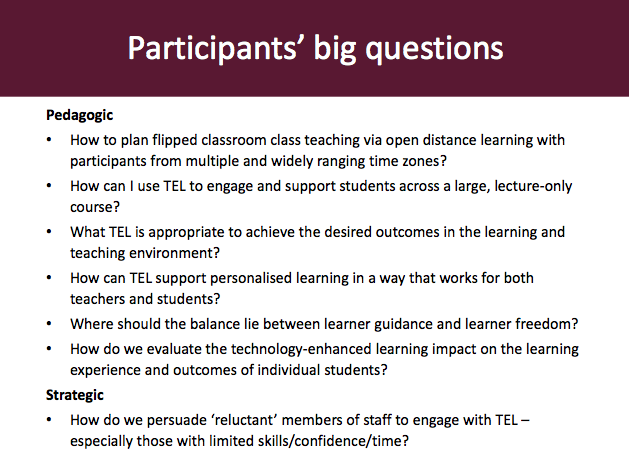Enrol on ocTEL – Open Course in Technology Enhanced Learning – start date 28th April
16/04/2014 in About this course, Course information
The Open Course in Technology Enhanced Learning (ocTEL) is back! Starting on the 28th April 2014 you will be able to participate in this free online course designed to help you better understand ways to use Learning Technology for teaching, learning and assessment. The course has undergone a revision and now is shorter (six weeks plus induction week) and we are working on incorporating new features including Open Badges for accreditation. Register now at http://go.alt.ac.uk/octel-register.
Below is an outline of the course to give you a sense of the timings and content. ocTEL doesn’t follow a traditional format and whilst we’d love everyone to complete ‘the course’ you can drop-in for the material and events most useful to you. Ultimately our aim is to help you make connections between people and knowledge to aid your personal development. ocTEL is also an ideal opportunity to consider the connection with your existing skills and experience and Certified Membership of ALT (CMALT).
-
Week 0: TEL & the future (induction) – 28 Apr 2014
-
Week 1: Concepts and approaches – 5 May 2014
-
Week 2: Learners and learning – 12 May 2014
-
Week 3: Materials, platforms and technologies – 19 May 2014
-
Week 4: Support, feedback and assessment – 2 Jun 2014
-
Week 5: Leadership, management and keeping on track – 9 Jun 2014
-
Week 6: Enhancement, review and evaluation – 16 Jun 2014
The course is designed, written and supported by members of ALT on a pro bono basis. All its content depends on our community and your expertise, experience and know-how. You can contribute resources,become a tutor or help run one of the live sessions. You can also contribute to discussions, use the #ocTEL tag to share your own content across the web.
All content of the course is published under a creative commons licence (CC-BY), which means that you can re-use it, share it and re-mix it.
More information
See the ocTEL platform: http://octel.alt.ac.uk/
Register for the course: http://go.alt.ac.uk/octel-register
Watch a short film about the 2013 course: http://youtu.be/QLd0qt6Jg2Q
Promoting the course
If you’d like to help promoting the course to make sure there are plenty of participants to share and learn with then click here to tweet the text below:
Registration is open for the Open Course in Technology Enhanced Learning (#ocTEL). 28 April 2014 #altc http://go.alt.ac.uk/octel-register

